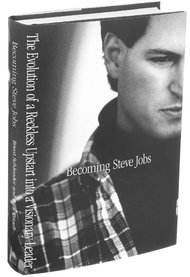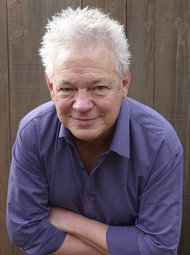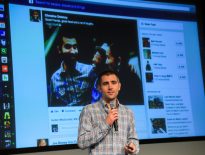Apple co-founder Steve Jobs has been the subject of myriad books. But the latest one, “Becoming Steve Jobs,” released on Tuesday, is the only one with Apple’s stamp of approval.

In tweets, Apple has publicly endorsed the book as the most comprehensive biography of Mr. Jobs to date. Apple executives also haven’t been shy about slamming a previous biography, “Steve Jobs,” by Walter Isaacson, which Mr. Jobs directly participated in.
The new book was written by Brent Schlender and Rick Tetzeli, both longtime tech journalists. The biography is viewed through the lens of Mr. Schlender’s personal experience interviewing Mr. Jobs over the last two decades. The following is an edited transcript of an interview with both authors.
Q.
When did you decide to write about Steve Jobs, and were you hesitant to take on a subject that had already been covered so extensively by Walter Isaacson and others?
A.
RICK: Brent and I worked on a Fast Company cover story about Jobs in early 2012. Halfway through reporting and editing the piece, I realized that if we worked together we could deliver a pretty nuanced book. I thought we could create a picture of Steve that was different from anything that was out there.
Q.
Why did you feel that there was room for another book about him, and how did you aim to distinguish your account from previous ones?
A.
RICK: Basically, there was nothing out there that documented how he had changed. I felt that the early stereotype of him as half-genius, half-jerk from birth had stuck around — it was set during his early years at Apple, and it had lasting power mainly because after 1987 he restricted press coverage, because he had sharp elbows.
BRENT: I felt that Steve was one of the most complex people I had ever known, and that after having known him for more than 20 years, I could see a trajectory of personal change that I didn’t think had been fully described or properly appreciated. I think the continuing apparent appetite for books and film projects about his life shows that there remains a deep fascination for Steve and what made him tick.

Q.
You gained unprecedented access to Apple executives from a company that is typically tight-lipped. How did you do manage to do that, and were you surprised that Apple was willing to cooperate?
A.
RICK: We sold the book to Crown in 2012 without knowing whether or not Apple would give us interviews with any of its current employees. The company had not worked with us for the original Fast Company piece. After the F.C. piece came out, we asked whether they’d work with us on a book and they said absolutely not. We’d ask again, from time to time, as we reported, but it wasn’t until a year and a half later that they agreed to participate. I think enough time had passed after Steve’s death for them to consider talking for a new book.
Q.
The book is largely a recounting of Brent’s memories of Steve over the past two and a half decades. What was the most powerful, memorable moment you shared with Steve, and what did it mean to you?
A.
BRENT: There was no single most memorable moment in the sense of being an “aha” moment. It was a special experience to take my two daughters over to his house to watch an early cut of “Toy Story,” and it was memorable that he came to visit me twice while I was in the intensive care unit at Stanford Medical Center in 2005. But it was really the cumulative effect of seeing him with some regularity, and not always for the purposes of reporting a story, that made it easier for me to look at him as an endlessly fascinating person. You never knew what he might say.
Q.
The book makes a distinction between “Steve 1.0″ (before Mr. Jobs started a computer company called NeXT) and “Steve 2.0″ (post-NeXT). And your sources say the narrative of Steve 1.0 prevailed over 2.0. How did that happen, when Steve became much more high-profile in his later years, especially after the success of the iPhone?
A.
BRENT: Steve made himself more widely available for interviews during those early years than he did, even during the “wilderness” years. He always told me that the only reason he would talk to reporters and writers was to promote a particular product or technology strategy. He’d gotten over the egotistical thrill of seeing his face on the cover of a magazine by then, and wanted to use his celebrity solely to help promote his business. So when he had something cool to show off, he would open up a little, but always in a very controlled way.
Q.
The book goes into great detail about Steve’s negotiations with the record labels for iTunes and the negotiations with AT&T for the iPhone’s terms. These days, the iBookstore is in bad shape, among other things. What do you make of this? Is this a sign that Apple’s negotiating power has weakened without Steve?
A.
BRENT: I’d say it is a situational difference. Time does not stand still, nor does the marketplace. Steve helped actually create a legitimate marketplace for paid-for digital downloads of music, and for what we now call smartphones and tablets. Streaming music is an established marketplace already, which Apple was slow to embrace, and so it is much more difficult to break into it. Same for e-books.
Q.
The book mentions a quote where Steve says Apple will never make a television because he doesn’t like television. Do you really believe that?
A.
BRENT: I’m sure it was true at the time, but you learned over time that Steve was always willing to change his mind if circumstances changed or if a new technology opened some new doors.
Q.
Have you been surprised in recent days by the outpouring of support for your book from Apple executives like Tim Cook and Eddy Cue? [Cue tweeted his approval of the book last week.]
A.
RICK: As far as we know, Tim Cook hasn’t publicly endorsed the book. Eddy Cue’s tweet was completely unexpected and we were thrilled about that. Even in its more open Tim Cook iteration, Apple is a company that tends to play things pretty close to the chest.
Q.
Toward the end of the book, you note that Steve took on the role of the company’s sole spokesperson, perhaps to a fault. Tim, by contrast, has significantly opened up the company’s communications to the world. Do you think that’s better for Apple? Does that make Tim a better C.E.O. for Apple now than Steve would have been if he’d survived?
A
BRENT: Again, it all depends on the circumstances. Apple doesn’t have another Steve to act as its public pitchman. Nobody does. He was a singular talent in that regard. Our book doesn’t even attempt to speculate about Apple beyond Steve’s passing. Our sole purpose was to try to explain why he was so much more effective by the end of his life than he was when he was a young entrepreneur.





